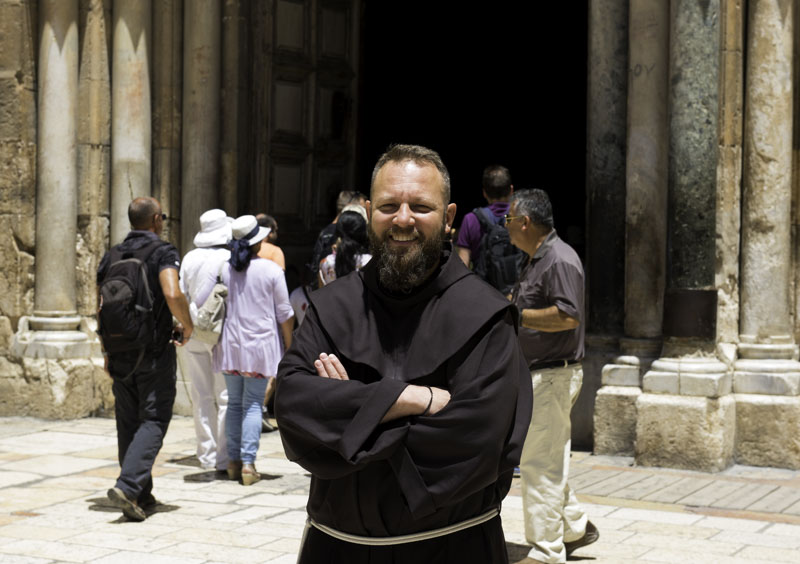
800 years have passed since the friars arrived in the Middle East, and many things have changed since the beginning of this adventure. However, the commitment and dedication with which, for 800 years, the friars have guarded the holy places and have worked to serve the local people have not changed. For this reason, in order to understand what the Custody of the Holy Land is today, we must begin with them and their stories: they come from all over the world and from different countries and each of them has a specific mission.
Fr. Zacheusz Drazek, originally from Poland, has been a priest for 15 years and arrived in the Holy Land four years ago. Many pilgrims have met him or will meet him on their own path. Today, in fact, he is serving the Holy Sepulcher as President of the Franciscan fraternity that lives in the monastery , as is prescribed by the Status Quo.
Why did you become a friar?
Near my home, there was a Franciscan monastery and so throughout my childhood I lived beside the Franciscans. At six years old, I was an altar boy and later on I always helped the Franciscans with their different activities and their groups, such as a group where I helped with sick people. These friars showed me what it meant to be a Franciscan, and therefore as a child I thought I could become a friar. I always liked the Franciscan habit and I was attracted to a fraternal life of prayer, meeting people and living very simply: it is a life of poverty in which you can still give to others. The friars I met were very open. So after I graduated, I went to do my novitiate period.
How did you find out about the Custody of the Holy Land and why did you want to be part of it?
My province in Poland has ties to the Holy Land and more or less ten friars from this province have done served here. Some studied theology, [and] others served the Holy Sepulcher. Also, I had met a friar, Claudiusz, who had been a friar at Mount Tabor. He spoke to me about the Holy Land a lot and I was really interested. I always asked myself “where can I spend my life?” Before I thought I would be a missionary in Africa, and then my missionary life began in the Holy Land. St. Anthony, who went to Morocco, also inspired me.
What is your mission in the Holy Land?
I got here four years ago. The friars who come to do their mission here from other countries are almost always sent to the Basilica of the Resurrection. My life is here, in front of the Holy Tomb, Calvary, and among the many pilgrims. I always say to the pilgrims that without the friars who have been there for 800 years, Catholics could not celebrate the liturgies or the mass here.
How do you combine your mission with your being Franciscan?
Our community here is very different from other monasteries. We have a very regular prayer and we carry out our Franciscan life with the pilgrims, with the people who pass through. The religious life of a Franciscan friar is a life before the Lord.
What motivates you in your mission and spiritual life?
Prayer keeps me going, but so does fraternal life. Here we spend almost 24 hours per day together; we see each other in the hallways, in the chapel; we eat together and so on. After closing at nine o'clock, we can no longer leave the Holy Sepulcher. There are ten of us, including the lay friars who work in the sacristy and the seven priest friars. Each one has his own precise mission.
Has living in the Holy Land has changed your relationship with religion?
Yes a lot. Being in the Holy Land gives [you] the opportunity for a more open life: we meet people from other countries, who speak other languages. We have the same life but with a different mentality. Food, for example, is different in different countries. Therefore, cultural diversity enriches us a lot.
What is your relationship with St. Francis like?
When I was a friar, I was very fascinated by St. Francis. Now I still am, but I try to search for the meaning of my Franciscan being every day. What does it mean today to be a friar? What does it mean here, but also in our world, where there are wars and the hardships? What is the meaning of our poverty? For example, here at the Holy Sepulcher, we have not changed our furniture for 50 years. I must always ask myself: what would St. Francis want today?
What would you tell a young man who is discerning his vocation?
I always say that there is no more beautiful life than a religious one, as a friar. Life is so rich, so different... You do not have to be afraid to leave everything for Christ, because you will have everything you need.
N.S. - B.G.




